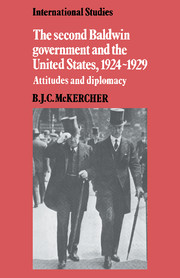Book contents
- Frontmatter
- Contents
- Acknowledgements
- List of abbreviations
- 1 THE SECOND BALDWIN GOVERNMENT AND THE UNITED STATES, NOVEMBER 1924–JUNE 1929
- 2 FOREIGN OFFICE PERCEPTION OF REPUBLICAN FOREIGN POLICY, NOVEMBER 1924–MAY 1927
- 3 THE ONSET OF NAVAL DEADLOCK, JUNE–AUGUST 1927
- 4 BELLIGERENT VERSUS NEUTRAL RIGHTS, AUGUST–DECEMBER 1927
- 5 THE PACT TO RENOUNCE WAR, JANUARY–JULY 1928
- 6 ARBITRATION, BELLIGERENT RIGHTS, AND DISARMAMENT, JANUARY–JULY 1928
- 7 THE CRISIS IN ANGLO-AMERICAN RELATIONS, AUGUST–NOVEMBER 1928
- 8 THE AMERICAN QUESTION RESOLVED, NOVEMBER 1928–JUNE 1929
- Notes
- Bibliography
- Index
2 - FOREIGN OFFICE PERCEPTION OF REPUBLICAN FOREIGN POLICY, NOVEMBER 1924–MAY 1927
Published online by Cambridge University Press: 10 November 2009
- Frontmatter
- Contents
- Acknowledgements
- List of abbreviations
- 1 THE SECOND BALDWIN GOVERNMENT AND THE UNITED STATES, NOVEMBER 1924–JUNE 1929
- 2 FOREIGN OFFICE PERCEPTION OF REPUBLICAN FOREIGN POLICY, NOVEMBER 1924–MAY 1927
- 3 THE ONSET OF NAVAL DEADLOCK, JUNE–AUGUST 1927
- 4 BELLIGERENT VERSUS NEUTRAL RIGHTS, AUGUST–DECEMBER 1927
- 5 THE PACT TO RENOUNCE WAR, JANUARY–JULY 1928
- 6 ARBITRATION, BELLIGERENT RIGHTS, AND DISARMAMENT, JANUARY–JULY 1928
- 7 THE CRISIS IN ANGLO-AMERICAN RELATIONS, AUGUST–NOVEMBER 1928
- 8 THE AMERICAN QUESTION RESOLVED, NOVEMBER 1928–JUNE 1929
- Notes
- Bibliography
- Index
Summary
In view of the general odium in which America is held, it is fully as important to her to remember what we think of her as it is for us to worry about what she thinks of us.
Vansittart, August 1926The blockade claims controversy
Three months after Chamberlain became foreign secretary, Cecil Hurst travelled by ship to the United States. On board he met Frank Kellogg, the American ambassador at London who had just resigned and was returning to Washington to take office as Coolidge's new secretary of state. In the course of a general conversation, the secretary-designate commented on the subject of outstanding claims that his government had against the British government; Hurst understood him to include with these blockade claims dating from the Great War. Between August 1914 and April 1917 a large number of American industrialists, shippers, and other traders, who lost cargoes that were intercepted and seized as war contraband or who believed that the British blockade had interfered with their neutral right to trade and as a result had lessened their profits, filed private complaints against the British government through the State Department at Washington. These were the blockade claims. In reporting this conversation to the Foreign Office, Hurst suggested that he might have been mistaken in assuming that Kellogg had included blockade claims; nevertheless, he recommended that preparatory work on this question should begin.
- Type
- Chapter
- Information
- The Second Baldwin Government and the United States, 1924–1929Attitudes and Diplomacy, pp. 34 - 54Publisher: Cambridge University PressPrint publication year: 1984



